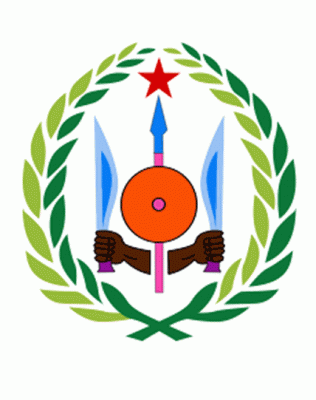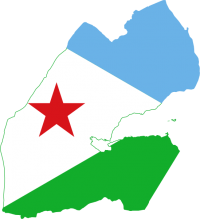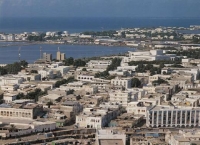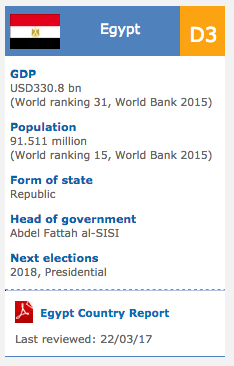Djibouti: Djibouti Outlook for 2016-17
2016/05/30

The country (Djibouti) is situated in Eastern Africa and is bordering the Gulf of Aden and the Red Sea, between Eritrea and Somalia. It has borders with Eritrea for 109 km, Ethiopia for 349 km and Somalia for 58 km.
Land in Djibouti is coastal plain and plateau separated by central mountains.
The climate is desert, torrid and dry.
Djiboutian(s) speak French (official), Arabic (official), Somali, Afa
Djibouti is a small country in which more than 23% of the population lives in extreme poverty. It is poorly endowed with natural resources and has limited arable land, rainfall and water. With less than 1,000 km2 of arable land (0.04 percent of 23,200 km2) and an average annual rainfall of 5.1 inches, Djibouti has a chronic food deficit and is totally dependent on imports to meet its food needs. As such, it is highly sensitive to external shocks such as spikes in food and fuel prices and natural disasters such as floods and droughts. Djibouti’s economy is dependent on foreign financing, Foreign Direct Investments, rents from foreign countries’ military bases, and port services, which capitalize on both the strategic position at the southern entrance to the Red Sea and the fact it is Ethiopia’s main import-export route.
With a growth rate of 5.9% in 2014 the country’s economy continued the acceleration witnessed in 2013 (5%). This momentum is expected to be maintained in the years ahead, supported by the pursuit of a huge investment programme, notably in infrastructure. The investment programme, which aims to transform the country into a regional platform of commercial, logistical and financial services, reflects a radical change of direction for the national economy.
The growth rate is expected to reach 6% in 2015. The huge investment programme that is supporting this growth is driven by increased port activity and foreign direct investment (FDI). Most of the port activity concerns the transit of merchandise to and from Ethiopia. The flow of FDI into the country is concentrated on infrastructure for ports, roads, buildings and hotels. In 2013, FDI accounted for 18.6% of gross domestic product (GDP), a record level.
The country is advancing only slowly in terms of economic and financial governance. Public finances recorded a deficit of 3.1% of GDP in 2013, compared to 1.1% in 2011 and 2.7% in 2012. The deficit remained high in 2014 at 2.6% of GDP. Djibouti’s external position remains fragile because of deficits in its trade balance and current accounts. The country’s trade balance is structurally loss-making and the trade deficit continued to widen in 2014. The level of debt remains critical and puts Djibouti at high risk of over-indebtedness.
The economy remains weakly diversified, with a predominant informal sector. The economy is mainly concentrated on transport activities and connected services that are served by the country’s geostrategic position on the Gulf of Aden, at the intersection of strategic maritime trade corridors for the transport of goods and oil. The concentration of economic activities and jobs in the city of Djibouti, notably around the port and foreign military bases, has encouraged a considerable flow of inhabitants to the capital, accelerated by unemployment and drought. Today, nearly 80% of the population is concentrated in the country’s towns, with more than 60% in the city of Djibouti, the capital.
The pace of urbanisation has been very swift and all the issues of economic and social development are now concentrated in the urban fabric. The authorities have realised that, for about 20 years, development and its sustainability have depended upon the efforts made to correct imbalances between the capital and regional towns.
A Country Partnership Strategy (CPS) for 2014-2017 was launched in March 2014. This is the first World Bank Group strategy to combine the resources and expertise of the International Development Association (IDA), International Finance Corporation (IFC), and the Multilateral Investment Guarantee Agency (MIGA). The strategy is anchored in the Government of Djibouti’s Vision 2035 development plan. The overarching objective of the Strategy is to support the government’s vision to reduce extreme poverty and build the foundations for shared growth by harnessing the country’s human and economic potential. The strategy rests on two pillars—reducing vulnerability and strengthening the business environment—while focusing on institutional strengthening and gender as cross-cutting themes.
The World Bank provides assistance and funding to Djibouti through the International Development Association (IDA). As of August 31, 2015, the active WBG portfolio for Djibouti comprises seven IDA projects, for a total commitment of US$45 million. The total undisbursed balance is about US$30 million. The World Bank teams have continued to leverage IDA resources through Trust Funds (TF), both recipient- and Bank-executed and including 1 GEF operation, with a net commitment value of about US$30 million as of July 2, 2015. The current Djibouti portfolio – both IDA and TF – focuses on social safety nets, energy, rural community development, disaster risk management, urban poverty reduction, health, education, governance and private sector development. All projects place particular emphasis on women and youth.
An IDA-IFC Governance for Private Sector Development Project was approved in June 2014. This is the first Bank Group project focused on supporting private sector development and is aimed at judicial reform as it relates to the resolution of commercial disputes; and support for business environment reforms in key areas measured by Doing Business. IDA and IFC initiatives will jointly support regional integration by strengthening cross-border trade through technical assistance to improve the quality and timeliness of related services and the establishment of a one-stop shop for business creation. The FIRST Initiative also supports Djibouti to improve access to financial services through the creation of a guarantee fund and the modernization of payment systems. Djibouti also benefits from a US$427 million guarantee from MIGA for the development, design, construction, management, operation and maintenance of the container terminal in Doraleh.

- Related Articles

Africa's Relationship With China Is Ancient History
2017/07/02 In 2002 South Africa's Parliament unveiled a digital reproduction of a map - of China, the Middle East and Africa - that some speculated could be the initial map of the African continent. The Da Ming Hun Yi Tu - the Comprehensive Map of the Great Ming Empire - was drawn up around 1389 during the Ming Dynasty, according to historian Hyunhee Park.
Africa: Making Things Happen at the Bank - 'Not a Talk Shop' - Akin Adesina
2017/07/02 Dr. Akinwumi Adesina is focusing on five areas to achieve the African and world goals for a prosperous continent since becoming president of the African Development Bank - Africa's major public financial institution in September 2015. He was a keynote speaker at this month's Corporate Council on Africa's U.S.- Africa Business Summit in Washington D.C. and moderated a lively panel with five African government ministers. He as well received the Gene White Lifetime Succcess Award from the World Child Nutrition Foundation. This week, he was named the 2017 recipient of the World Food Prize, a prestigious honor that includes a $250,000 award. In an interview in Washington, DC, Adesina discussed the Development Bank's ambitious schedule and his vision for attracting the increase capital Africa needs. Posting questions for AllAfrica was Noluthando Crockett-Ntonga.
Climate change laws around the world
2017/05/14 There has been a 20-fold increase in the number of global climate change laws since 1997, according to the most comprehensive database of relevant policy and legislation. The database, produced by the Grantham Research Institute on Climate Change and the Environment and the Sabin Center on Climate Change Law, includes more than 1,200 relevant policies across 164 countries, which account for 95% of global greenhouse gas emissions.
Economic cooperation and trade made new achievements.
2015/10/02 In 2013, the friendly relations and cooperation between the People's Republic of China and the Republic of Djibouti continued to maintain the sound momentum of increase. The two nations maintained close political exchanges. In March, President Ismail Omar Guelleh sent a letter of congratulations to President Xi Jinping on his election as President of China. In April, President Guelleh sent a letter of condolences to President Xi on the earthquake in Lushan County, Sichuan Province. In April, Ai Ping, Vice Minister of the International Department of the CPC Central Committee, visited Djibouti.
Djibouti City
2012/12/16 Djibouti City is the capital and largest city of Republic of Djibouti in the Horn of Africa. Two thirds of the country's population live in the town. The city is situated on the coast, on the Gulf of Tadjoura right across from Yemen. Local features include beaches along its eastern shore and the large Central Market, the national stadium Stade du Ville, the Presidential Palace and Hamoudi Mosque. On account of its numerous exotic buildings and structures, the city has been likened to a European settlement and described as a "French Hong Kong in the Red Sea". Djibouti has the status of both a city and a state. It is also the seat of the Intergovernmental Authority on Development (IGAD) as well as several other continental and international organizations.
- Djibouti News
-
- BOTSWANA: Children on the move from Africa do not first aim to go to Europe, new UNICEF study shows
- BOTSWANA: WHO lauds Africa’s progress in malaria, HIV control
- BOTSWANA: South Africa plays an active role in the AU
- BOTSWANA: Africa: How to Adapt to Beat Crippling Droughts
- BOTSWANA: Africa: Expanded Engagement for Caterpillar - Boosting Sales & Alleviating Poverty
- BOTSWANA: WHO Africa Health Forum App Leads the Way
- Trending Articles
-
- UNITED STATES: EU's Juncker says ready to retaliate if needed over new U.S. sanctions on Russia
- QATAR: Qatar focuses on preventive care in new national health strategy
- ARGENTINA: Brazil, Argentina prosecutors say governments interfering in Odebrecht probe
- EUROPEAN UNION: Britain's Brexit Minister David Davis has begun negotiations on the country's divorce from the EU
- ARGENTINA: ARGENTINA: Country Reaches Deal To Export Lemons To Mexico
- CHINA: Why China and Russia will be best frenemies forever












